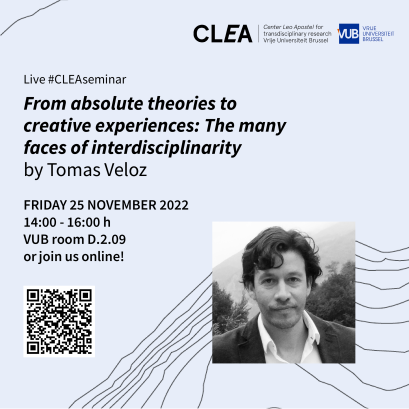(At the request of many who could not attend this seminar on 17 June, Tomas Veloz will present it again on 25 November, 2022).
Studies of interdisciplinarity generally make a distinction between theory and practice as the two modes of interdisciplinarity. While the former is occupied with finding better conceptualizations and reasoning of problems, the latter is occupied with efficient communication and implementation of solutions. In this talk, Tomas Veloz will take a little step back to such a traditional problem-oriented vision of interdisciplinarity, and will propose that interdisciplinarity is not only a powerful way to solve problems, but also to conceive human life in a more embracing way.
Namely, he will review some aspects of the theory of knowledge in a non-technical way and will distill some features that allow characterizing the many faces in which we approach reality as an interdisciplinary object of inquiry, from absolute theories described by immutable laws, to creative experiences happening by the enactment of contextual events.
Interestingly, the many faces that Veloz will describe in this talk allow for a characterization of the different levels at which relevant interdisciplinary phenomena such as global warming and social inequality can be approached. This helps to prescribe a methodology to engage interdisciplinary teams by identifying the various features that need to be taken into consideration for a thorough interpretation of the phenomena. Moreover, such characterization can be applied to suggest that human life must incorporate the discovery and creation of both our surroundings and ourselves, a view that is compatible with both recent modern approaches to cognition and ancient worldviews.
About the speaker
Tomas Veloz is the director of Mathematical Modeling at the Center Leo Apostel (CLEA) of the Vrije Universiteit Brussel (VUB), where he leads the Systemic Modeling and Applications (SYMP) research group. He has a PhD in Interdisciplinary Studies and an MSc in computer science, with majors in mathematics and physics. His research covers various facets which can be summarized as interdisciplinary mathematical modeling. His areas of application include biochemistry, epidemiology, ecology, anthropology, cognitive science, social science, systems theory and cybernetics, among others. Tomas Veloz generally approaches modeling from a ‘complex adaptive systems’ perspective applying modeling languages such as reaction networks, dynamical systems, and quantum structures. Additionally, he has developed a philosophical body of work in the foundations of quantum theory, the interface between the arts and sciences, and studies of interdisciplinarity. Veloz is also the founder and director of the Foundation for the Interdisciplinary Development of Science, Technology and Arts based in Chile, which collaborates with CLEA and other institutions worldwide to generate and disseminate integrated knowledge and to develop projects with a social impact.
Practical
The CLEA seminars are taking place simultaneously at the VUB campus in Etterbeek, Brussels, and online (via Zoom) and are open to everyone interested!
When. Friday November 25, 2022 from 14:00 until 16:00h
Where (live). VUB campus Etterbeek, room D.2.09
Online. You can follow online via Zoom. You may need a Meeting ID and passcode to enter.
Zoom link: https://us06web.zoom.us/j/82757798426?pwd=em9sQlJDVjJYTEFRNk01dEJLWGxGUT09
Meeting ID: 827 5779 8426
Passcode: 122127
Video:

